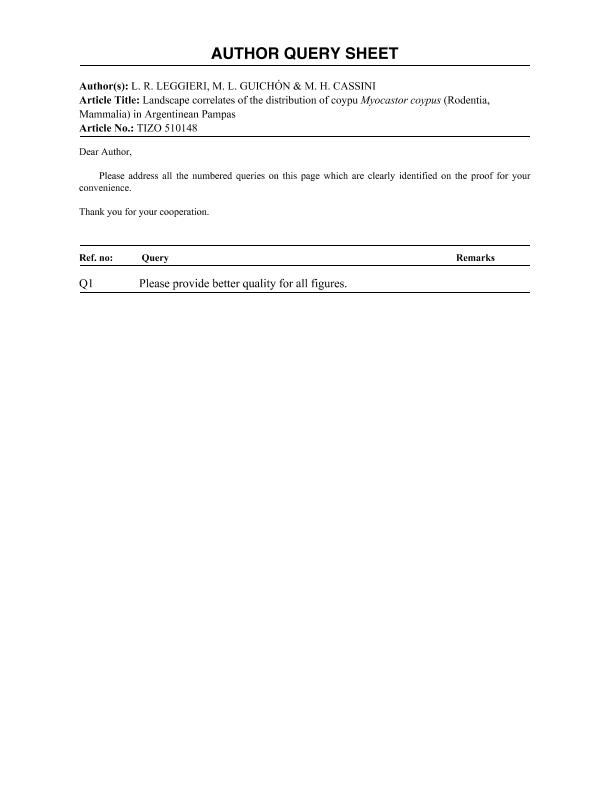Mostrar el registro sencillo del ítem
dc.contributor.author
Leggieri, Leonardo Ramón

dc.contributor.author
Guichón, M. L.
dc.contributor.author
Cassini, Marcelo Hernan

dc.date.available
2016-12-28T14:35:51Z
dc.date.issued
2011-03-07
dc.identifier.citation
Leggieri, Leonardo Ramón; Guichón, M. L.; Cassini, Marcelo Hernan; Distribution of coypu (Myocastor coypus) in Argentinean Pampas: landscape correlates and integration with smaller ecological scales; Taylor & Francis Ltd; Italian Journal Of Zoology; 78; 1; 7-3-2011; 124-129
dc.identifier.issn
1125-0003
dc.identifier.uri
http://hdl.handle.net/11336/10407
dc.description.abstract
The coypu is a rodent indigenous to aquatic habitats in southern South America, which is considered a pest where it has been introduced and a valuable furbearer resource within its native range. The objective of this study was to identify the main landscape correlates of coypu distribution in the Pampas. Previous studies provided two non-exclusive hypotheses: (1) if hunting pressure regulates coypu distribution, then coypu presence should decrease in areas with high human density, while (2) if resource availability determines coypu landscape patterns, then coypu presence should be high in flooded areas with low human management of plant communities, that is natural grasslands used for extensive cattle raising. We sampled signs of coypu activity and 11 associated environmental variables in 87 600-m transects distributed in 14 rivers and streams of the Pampas region. The first factor of the principal component analysis (PCA) was associated with the wide of the alluvial plain and the agricultural use of land, the second one with human density in the surrounding area. We applied a multiple linear model between the first three factors of the PCA and the proportion of positive transects per watercourse. Our results indicated that coypus are less frequently found in urban and semi-urban landscapes. We postulate that hunting pressure is the main cause of this negative association, which is consistent with previous studies conducted at smaller ecological scales.
dc.format
application/pdf
dc.language.iso
eng
dc.publisher
Taylor & Francis Ltd

dc.rights
info:eu-repo/semantics/openAccess
dc.rights.uri
https://creativecommons.org/licenses/by-nc-sa/2.5/ar/
dc.subject
Hunting Effect
dc.subject
Landscape Features L
dc.subject
Spatial Scales
dc.subject
Species Distribution
dc.subject.classification
Zoología, Ornitología, Entomología, Etología

dc.subject.classification
Ciencias Biológicas

dc.subject.classification
CIENCIAS NATURALES Y EXACTAS

dc.subject.classification
Ecología

dc.subject.classification
Ciencias Biológicas

dc.subject.classification
CIENCIAS NATURALES Y EXACTAS

dc.title
Distribution of coypu (Myocastor coypus) in Argentinean Pampas: landscape correlates and integration with smaller ecological scales
dc.type
info:eu-repo/semantics/article
dc.type
info:ar-repo/semantics/artículo
dc.type
info:eu-repo/semantics/publishedVersion
dc.date.updated
2016-12-27T20:13:11Z
dc.identifier.eissn
1748-5851
dc.journal.volume
78
dc.journal.number
1
dc.journal.pagination
124-129
dc.journal.pais
Reino Unido

dc.journal.ciudad
Londres
dc.description.fil
Fil: Leggieri, Leonardo Ramón. Universidad Nacional de Luján. Departamento de Ciencias Básicas; Argentina. Consejo Nacional de Investigaciones Científicas y Técnicas; Argentina
dc.description.fil
Fil: Guichón, M. L.. Universidad Nacional de Luján; Argentina
dc.description.fil
Fil: Cassini, Marcelo Hernan. Universidad Nacional de Luján; Argentina. Consejo Nacional de Investigaciones Científicas y Técnicas; Argentina
dc.journal.title
Italian Journal Of Zoology

dc.relation.alternativeid
info:eu-repo/semantics/altIdentifier/url/http://www.tandfonline.com/doi/abs/10.1080/11250003.2010.510148
dc.relation.alternativeid
info:eu-repo/semantics/altIdentifier/doi/http://dx.doi.org/10.1080/11250003.2010.510148
Archivos asociados
